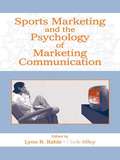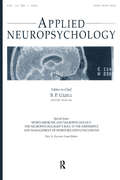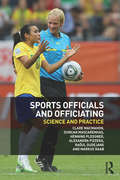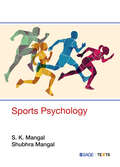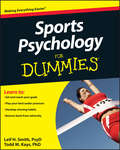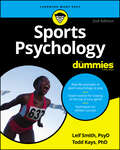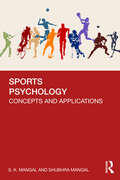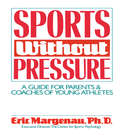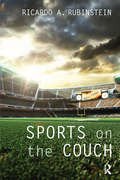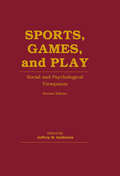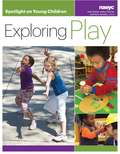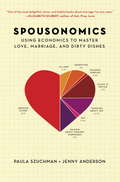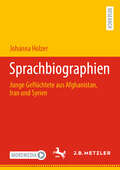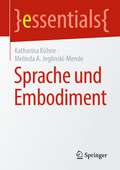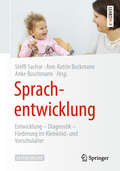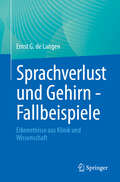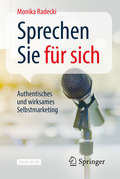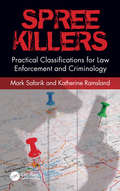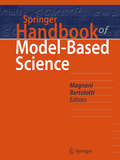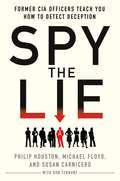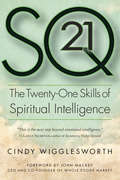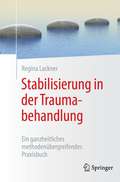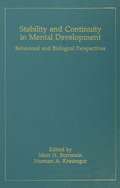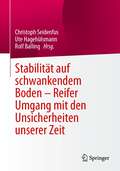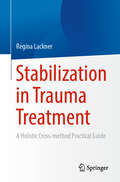- Table View
- List View
Sports Marketing and the Psychology of Marketing Communication
by Chris Riley Lynn R. KahleSports marketing is one of the fastest growing areas of marketing communication. This book advances understanding in this emerging area. It presents sports marketing in a scholarly and comprehensive way, covering major topics of discussion in sports marketing and the psychology of communication. Several new, innovative topics are introduced, such as SportNEST and consumption communities, and many classic topics are brought up to date, including sponsorship, ambush marketing, identification, endorsements, basking in reflected glory, and licensing. Many of the topics that seem to center around sports show up as well, such as sneakers, ethics, risky behavior, and even investments. Utilizing a psychological approach to understanding sports marketing, first-rate authors discuss the most important topics. The book covers all major topics of sports marketing, including: sponsorship from several different perspectives--the major force in sports marketing; ambush marketing--how non-sponsors seek to reap the benefits without paying the price; and licensing--using the sale of items, such as T-shirts to increase profit and marketing.
Sports Medicine and Neuropsychology: the Neuropsychologist's Role in the Assessment and Management of Sports-related Concussions:a Special Issue of applied Neuropsychology
by B. P. UzzellThe focus of Sports Medicine and Neuropsychology is the question of what role the neuropsychologist should have in the diagnosis, treatment, and management of sports-related concussions. The goal of this special issue is to examine the most current issues facing this growing and dynamic field of neuropsychology. The first article is dedicated to reviewing current issues in the neuropsychological assessment of concussions in sports-related events. The next paper examines data on over six million practice-and-game-exposures among athletes participating in the NCAA's Injury Surveillance System. Two contributions examine the empirical role that neuropsychologists can have in the area of concussion research. The final two papers review the advantages and limitations on computer-based assessment of sports-related concussions and discuss neuropsychology's role in return-to-play decisions following them.
Sports Officials and Officiating: Science and Practice
by Henning Plessner Markus Raab Clare MacMahon Duncan Mascarenhas Alexandra Pizzera Raôul OudejansSports officials (umpires, referees, judges) play a vital role in every sport, and sports governing bodies, fans, and players now expect officials to maintain higher professional standards than ever before. In this ground-breaking book, a team of leading international sport scientists and top level officials have come together to examine, for the first time, the science and practice of officiating in sport, helping us to better understand the skills, techniques and physical requirements of successful refereeing. The book covers every key component of the official’s role, including: Training and career development Fitness and physical preparation Visual processing Judgement and decision-making Communication and game management Psychological demands and skills Using technology Performance evaluation Researching and studying officials in sport Top-level officials or officiating managers contribute in the ‘Official’s Call’ sections, reflecting on their experiences in real in-game situations across a wide range of international sports, and on how a better understanding of science and technique can help improve professional practice. No other book has attempted to combine leading edge contemporary sport science with the realities of match officiating in this way, and therefore this book is vital reading for any advanced student of sport science, sport coaching or sport development, or any practising official or sports administrator looking to raise their professional standards.
Sports Psychology
by S. K Mangal Shubhra MangalA comprehensive textbook covering fundamentals of psychology and its application and usage in sports and related activities. Sports Psychology is based on the premise that one's participation and performance in sports is as much psychology oriented as it is a matter of physiological skill and talent. This textbook offers to build a sound groundwork in concepts and theories of psychology for their appropriate application to enhance participation in sports activities. The contents of the book will aid students, teachers, trainers, coaches as well as players to improve and maintain their performance in various sports activities. Written in a simple and user-friendly style, the textbook covers the syllabi of psychology courses on the subject as well as course curriculums of BPEd and MPEd programmes. Besides being an indispensable asset to students, the book will prove to be beneficial for coaches and sport psychologists engaging in the task of training, coaching and guiding the trainees and athletes. Key Features: • Chapters arranged to aid sequential learning and understanding of the concepts with a balanced blend of theory and practice • Traces the historical evolution of sports psychology as a subject of study and its current status and future trends • Throws light on the issues related to athletes' mental health including anxiety, stress, frustrations and conflicts, aggression and violence, and sports injuries and their management • Content adequately illustrated with examples, case studies, boxed materials, figures and tables
Sports Psychology For Dummies
by Leif H. Smith Todd M. KaysAcquiring the winning edge in sports-the mental edge Mental conditioning is now seen by many to be as critical to sports success as physical conditioning. And for parents eager to ensure their children have a winning edge-as well as a future college scholarship-nothing could be more critical to success. This book offers readers a comprehensive program to gain that winning edge, providing training tips and techniques along with helpful advice to keep in mind while competing. With practical advice on how to strengthen concentration (and when you shouldn't concentrate), talk yourself into winning, and develop routines that will lead to consistent improvement, the book's full personalized program will help any athlete gain over time the winning edge in any sport With tips on how to regulate your energy to avoid exhaustion; and how to enhance your team's chemistry through sports psychology Loaded with real-world examples from amateur and professional sports of all kinds Applicable to not only sports-but business as well-Sports Psychology For Dummies will enhance any competitor's motivation, focus, and will to win, when facing life's toughest challenges.
Sports Psychology For Dummies
by Leif H. Smith Todd M. KaysGet your head in the game with this hands-on guide to the psychology of sport There's more to getting into the right headspace for the big game or event than trying to think like a winner. Modern sports psychologists emphasize advanced strategies like biofeedback and neurofeedback, while encouraging the use of mindfulness and other mental health techniques. In Sports Psychology For Dummies, 2nd Edition, a team of athletic performance experts and psychologists walks you through the mental side of intense competition and training. From the importance of focus to the tactics designed to restore and improve confidence after a loss, you'll explore ideas such as goal setting, self-perception, and self-talk. This book also covers: Personalized plans for athletic success Real-life examples of sports psychology changing the athletic experience in different sports The wide variety of careers available in the field of sports psychology and how to get started in them Ideal for athletes, parents of student athletes, and coaches looking for ways to improve performance both on and off the field, Sports Psychology For Dummies is also the perfect resource for anyone interested in a career in this rapidly growing and evolving field.
Sports Psychology: Concepts and Applications
by Shubhra Mangal S. K. MangalThis book analyses the essential aspects of sports psychology by throwing light on issues related to the upkeep of athletes’ mental state and improving their performance in sports activities. On one hand, it covers topics like anxiety, stress, conflicts, overtraining, and sports injuries, and on the other, it includes strategies helpful for managing and developing skills for better performance in various sports activities. In its wide coverage, the volume discusses a range of key topics which include: • Sports psychology: historical perspectives and the present position • Contribution of heredity and environment, the role of growth and development, and the individual differences in sports psychology • How factors like intelligence, cognitive and emotional processes, personality, and motivation influence learning and the transfer of learning • The role of attention, concentration, and focus in the performance of athletes • Athletes’ mental and psyche levels displayed in the states of their anxiety, stress and conflicts, and aggression and violence • Sports injuries and their management • Overtraining and Burnout in Athletes • Group dynamics and guidance and counseling in the learning and development of the athletes, etc. Engaging and reader friendly, this book will be useful to students, researchers, and teachers of physical education, psychology, applied psychology, and sports psychology. It will also be key reading for trainees of the various sport academies, coaches, sports associations, managing bodies, and sport psychologists.
Sports Without Pressure: A Guide for Parents and Coaches of Young Athletes
by Eric MargenauFirst published in 1990. Routledge is an imprint of Taylor & Francis, an informa company.
Sports on the Couch
by Ricardo A. RubinsteinBringing together concepts from psychoanalysis with an attentive eye and the author's popular wisdom, Sports on the Couch explores the psychology of athletes and those around them. As a product of our culture, sport enables a break for our minds, since it allows us to disconnect from internal as well as external realities. We immerse ourselves in the world of play, managing to let out tensions and liberate a great deal of aggression in a socially acceptable way.
Sports, Games, and Play: Social and Psychological Viewpoints
by Jeffrey H. GoldsteinThis updated study of sports and recreation utilizes the most current research, introducing the latest innovations and analyses in new chapters while revising and expanding chapters from the previous edition. Presenting diverse methodological and conceptual approaches, this anthology reflects the current view of sports as a "natural laboratory" for ecologically valid research. This collection contains literature reviews, innovative theories and methods, and essays on various psychological and social aspects of sports, games, and organized play.
Spotlight On Young Children: Exploring Play
by Kathy Charner Holly Bohart Derry KoralekSupporting Young Children's Play and Learning Discover ways to provide a strong curricular approach for young children’s learning while endorsing a playful pedagogy. The articles in this collection emphasize using play to promote children’s skills in problem solving, decision making, and self-regulation; engaging diverse learners in play activities; and partnering with families to further children’s playful learning. Specific topics include ways educators can - Support infants’ and toddlers’ active explorations with sensory activities and unique materials - Provide opportunities for children to engage in active, physical play - Guide children’s learning through art play - Communicate to others the importance and value of play for children from birth through third grade Included is a professional development guide with questions and activities to help readers reflect on current teaching practices and inspire them to incorporate new ones.
Spousonomics: Using Economics to Master Love, Marriage, and Dirty Dishes
by Paula Szuchman Jenny AndersonAre you happy in your marriage-except for those weekly spats over who empties the dishwasher more often? Not a single complaint-unless you count the fact that you haven't had sex since the Bush administration? Prepared to be there in sickness and in health--so long as it doesn't mean compromising? Be honest: Ever lay awake thinking how much more fun married life used to be? If you're a member of the human race, then the answer is probably yes to all of the above. Marriage is a mysterious, often irrational business. Making it work till death do you part--or just till the end of the week--isn't always easy. And no one ever handed you a user's manual. Until now With Spousonomics, Paula Szuchman and Jenny Anderson offer something new: a clear-eyed, rational route to demystifying your disagreements and improving your relationship. The key, they propose, is to think like an economist. That's right: an economist. Economics is the study of resource allocation, after all. How do we--as partners in a society, a business, or a marriage--spend our limited time, money, and energy? And how do we allocate these resources most efficiently? Spousonomics answers these questions by taking classic economic concepts and applying them to the domestic front. For example: "Arguing all night isn't a sign of a communication breakdown; you're just extremely loss-averse and by refusing to give an inch, you're risking even greater losses." Stay late at the office, or come home for dinner? Be honest about your mother-in-law, or keep your mouth shut and smile? Let the cost-benefit analysis make the call. "Getting your spouse to clean the gutters isn't a matter of nagging or guilt-tripping; it's a question of finding the right incentives." Being too busy to exercise or forgetting your anniversary (again): your overtaxed memory and hectic schedule aren't to blame--moral hazard is." And when it comes to having more sex: merely a question of supply and demand! Spousonomicscuts through the noise of emotions, egos, and tired relationship cliches. Here, at last, is a smart, funny, refreshingly realistic, and deeply researched book that brings us one giant leap closer to solving the age-old riddle of a happy, healthy marriage.
Sprachbiographien: Junge Geflüchtete aus Afghanistan, Iran und Syrien
by Johanna HolzerDie vorliegende Untersuchung widmet sich den Sprachbiographien junger Migrant:innen aus Afghanistan, Iran und Syrien, die in den Jahren 2015 und 2016 nach Deutschland geflüchtet sind. Im Mittelpunkt stehen dabei sowohl individuelle Einblicke in die Spracherwerbsprozesse als auch gruppenübergreifende Analysen im Rahmen der vergleichenden Sprachbiographieforschung. Zudem wird ein sprachbiographisches Analysemodell vorgestellt, das einen methodischen Ansatz zur Auswertung mündlicher Daten bietet.
Sprache und Embodiment (essentials)
by Katharina Kühne Melinda A. Jeglinski-MendeJahrelang haben Wissenschaftler gedacht, dass wir die gesamte Palette des menschlichen Handelns und Denkens einem einzigen Organ – dem Gehirn – verdanken. Diese Annahmen werden allerdings mehr und mehr zu Gunsten des sogenannten Embodiments ergänzt: Ein Ansatz, der besagt, dass der Körper mit dem Geist/Gehirn als eine Einheit fungiert. In diesem Buch bringen wir Hinweise für verkörperte Sprache zusammen und erläutern, wie die Ergebnisse aus wissenschaftlichen Studien im alltäglichen Leben, wie zum Beispiel im Schulunterricht oder in der Klinik, anwendbar sind.
Sprachentwicklung: Entwicklung – Diagnostik – Förderung im Kleinkind- und Vorschulalter
by Tamara LautenschlägerDieses Lehrbuch bietet einen kompakten Gesamtüberblick über das aktuelle Wissen zum Thema Sprachentwicklung, Sprachdiagnostik und Sprachförderung. Der Fokus liegt auf dem Kleinkind- und Vorschulalter. Die Themen des Buches umfassen die Grundlagen und spezifische Aspekte der Sprachentwicklung bei ein- und mehrsprachig aufwachsenden Kindern. Es werden Auffälligkeiten im Spracherwerb und deren Diagnostik, auch in Verbindung zu anderen Entwicklungsbereichen, sowie Möglichkeiten zur Förderung und Therapie sprachlicher Fähigkeiten in verschiedenen Kontexten dargestellt. Alle Kapitel sind einheitlich strukturiert, von erfahrenen Expert*innen aus Wissenschaft, Lehre und Praxis theoretisch fundiert und anschaulich verfasst. Sie enthalten neben aktuellen Studienergebnissen zu zentralen Inhalten auch konkrete Anwendungsmöglichkeiten und Fallbeispiele.
Sprachverlust und Gehirn - Fallbeispiele: Erkenntnisse aus Klinik und Wissenschaft
by Ernst G. de LangenEin Lesebuch für alle Therapierende in den Bereichen Sprach-, Sprech- und Stimmtherapie sowie Logopädie, Neurologie und Neuropsychologie. Durch die authentische Beschreibung lernt der Lesende die Vielzahl an Syndromen jenseits der "klassischen" Störungsbilder aus dem Bereich der neurogenen Kommunikationsstörungen kennen und erkennen. Fallstudien und Fallbeispiele beschreiben eine große Vielfalt von erworbenen Störungen in den Bereichen Sprache, Schriftsprache, Artikulation und Phonation, deren Pathogenese erklärt und eine Beziehung zur funktionellen Neuroanatomie hergestellt wird.
Sprechen Sie für sich
by Monika RadeckiDieses Buch zeigt Ihnen als Fach- und Führungskraft, wie Sie selbstbewusst Öffentlichkeit in eigener Sache herstellen, ohne sich zu verbiegen. Um Einfluss zu nehmen, Ihren Berufserfolg zu steigern und Mitarbeiter und Teams zu motivieren. Lernen Sie Ihre vielfältigen Seiten kennen, Ihre Anliegen wertschätzend am Gegenüber orientiert zu präsentieren, Ihre Leistung auf angemessene Weise ins rechte Licht zu rücken und Ihre Themen zu platzieren. Begrüßen Sie dabei innere Widerstände, und erkennen Sie die positiven Zeichen von Gegenwind. Der Leitfaden ist geeignet als Führungs- und Teamentwicklungstool, als Karriereinstrument, als Anregung zur Selbstreflexion in Zeiten ständiger Veränderung. Ein Buch mit vielen Praxistipps und Übungen. Lassen Sie die Welt wissen, wofür Sie stehen und wie Sie Verantwortung übernehmen.
Spree Killers: Practical Classifications for Law Enforcement and Criminology
by Katherine Ramsland Mark SafarikSpree Killers: Practical Classifications for Law Enforcement and Criminology is the only exhaustive, up-to-date analytical book on spree killers, standing apart from those dedicated to mass murderers and serial killers. Multicides have traditionally been categorized as double, triple, mass, serial and spree— while, mass and serial have been further divided into subcategories. Spree killing, which involves the killing of at least three persons at two or more locations due to a precipitating incident that fuels the urge to kill, remains a poorly defined concept. In the United States, the Federal Bureau of Investigation (FBI) eliminated this term from its multicide nomenclature in 2005, but the authors examination of 359 cases involving 419 spree killers from 43 countries shows that not only is there enough diversity among spree killers to form classifications—similar to those devised for mass and serial—but also that subtypes offer distinct utility for identification, tracking, and warning potential targets. Spree Killers outline the designation of spree killer specifically and thoroughly. In addition to looking at existing literature, specific cases, and the behavioral patterns, it offers a fully worked up profile for the typology. The behaviors and motives for spree killers align in six categories, which are detailed in full. The book provides unique insight for police, forensic, and investigative personnel into what to look for to respond to, and—in some cases identify and stopping—certain types of spree killings.
Springer Handbook of Model-Based Science
by Tommaso Bertolotti Lorenzo MagnaniThis handbook offers the first comprehensive reference guide to the interdisciplinary field of model-based reasoning. It highlights the role of models as mediators between theory and experimentation, and as educational devices, as well as their relevance in testing hypotheses and explanatory functions. The Springer Handbook merges philosophical, cognitive and epistemological perspectives on models with the more practical needs related to the application of this tool across various disciplines and practices. The result is a unique, reliable source of information that guides readers toward an understanding of different aspects of model-based science, such as the theoretical and cognitive nature of models, as well as their practical and logical aspects. The inferential role of models in hypothetical reasoning, abduction and creativity once they are constructed, adopted, and manipulated for different scientific and technological purposes is also discussed. Written by a group of internationally renowned experts in philosophy, the history of science, general epistemology, mathematics, cognitive and computer science, physics and life sciences, as well as engineering, architecture, and economics, this Handbook uses numerous diagrams, schemes and other visual representations to promote a better understanding of the concepts. This also makes it highly accessible to an audience of scholars and students with different scientific backgrounds. All in all, the Springer Handbook of Model-Based Science represents the definitive application-oriented reference guide to the interdisciplinary field of model-based reasoning.
Spy The Lie: Former Cia Officers Teach You How To Detect Deception
by Philip Houston Michael Floyd Susan Carnicero Don TennantThree former CIA officers--among the world's foremost authorities on recognizing deceptive behavior--share their proven techniques for uncovering a lie Imagine how different your life would be if you could tell whether someone was lying or telling you the truth. Be it hiring a new employee, investing in a financial interest, speaking with your child about drugs, confronting your significant other about suspected infidelity, or even dating someone new, having the ability to unmask a lie can have far-reaching and even life-altering consequences. As former CIA officers, Philip Houston, Michael Floyd, and Susan Carnicero are among the world's best at recognizing deceptive behavior. Spy the Liechronicles the captivating story of how they used a methodology Houston developed to detect deception in the counterterrorism and criminal investigation realms, and shows how these techniques can be applied in our daily lives. Through fascinating anecdotes from their intelligence careers, the authors teach readers how to recognize deceptive behaviors, both verbal and nonverbal, that we all tend to display when we respond to questions untruthfully. For the first time, they share with the general public their methodology and their secrets to the art of asking questions that elicit the truth. Spy the Lie is a game-changer. You may never read another book that has a more dramatic impact on your career, your relationships, or your future.
Sq21
by Cindy WigglesworthNew in paperback with a foreword by John Mackey, founder and CEO of Whole Foods. According to author Cindy Wigglesworth, Spiritual Intelligence is the ability to behave with wisdom and compassion while maintaining inner and outer peace regardless of the situation. In her new book,SQ21: The Twenty-One Skills of Spiritual Intelligence, Cindy helps us understand how spiritual intelligence is analogous to such concepts as IQ and emotional intelligence (EQ). Using clear, practical language she defines the 21 skills that comprise spiritual intelligence and in doing so, teaches you the steps to begin developing your own spiritual intelligence. Cindy refers to her method as spiritual weightlifting-a process whereby we work to develop our muscles to shift away from thinking with our self-focused ego to behaving from our more loving and peaceful Higher Self. Her model is both faith-friendly and faith-neutral, andSQ21offers a way for atheists, people of faith, and those who are spiritual but not religious to understand each other and discuss our universal concerns. These skills are especially crucial for those in positions of leadership, since they help us to make decisions on a higher level while in the midst of stress, complexity, and high rates of change. If you want more peace, wisdom and compassion in your life -SQ21is the book for you.
Stabilisierung in der Traumabehandlung: Ein ganzheitliches methodenübergreifendes Praxisbuch
by Regina LacknerStabilisierung gilt als die erste der drei Phasen der Traumabehandlung und als Voraussetzung für eine gelingende Traumakonfrontation. Was bedeutet aber Stabilisierung, welche Wirkung hat sie und vor allem: welche Vielfalt an stabilisierenden Interventionen gibt es?Das Praxisbuch stellt verschiedene Zugänge und eine Fülle an unterschiedlichen in der Praxis bewährten Interventionen und Übungen vor. Darüber hinaus zeigt es anschaulich, dass Stabilisierung weitaus mehr bewirken kann, als man vermuten mag: sie bringt eine Vielfalt an weiteren Wirkungen mit sich, sodass sie zu einer umfassenden Stärkung und Heilung unserer Klienten beiträgt. Damit erleichtert, beschleunigt und erweitert sie den Prozess der Traumabehandlung. Ein großes Repertoire an Interventionen, Übungen und Anregungen sowie zahlreiche Beispiele veranschaulichen die Umsetzung in der Praxis. Das Buch richtet sich an Psychotherapeut*innen, Psycholog*innen, Ärzt*innen und Angehörige anderer helfender Berufe.
Stability and Continuity in Mental Development: Behavioral and Biological Perspectives
by Marc H. Bornstein Norman A. KrasnegorFilling a gap in current literature on human development, this volume explores the influence of psychophysiological, behavioral, and social factors on stability and continuity in the development of the mind during human infancy. The book reviews existing literature, presents new data, and discusses issues of substance in mental development, methodology, and interpretation. Commentaries by recognized experts interpret the research results from the previous chapters.
Stabilität auf schwankendem Boden - Reifer Umgang mit den Unsicherheiten unserer Zeit
by Christoph Seidenfus Ute Hagehülsmann Rolf BallingDie gegenwärtigen Krisen, Bedrohungen und Unsicherheiten verursachen einen Dauerstress, der die menschliche Lebensqualität, Gesundheit und personale Problemlösungs-Kompetenz immer mehr reduziert. In diesem Buch geht es darum zu diskutieren und aufzuzeigen, welche Sichtweisen/Ansätze hilfreich sein können, um Resilienz zu entwickeln, die erwachsene Problemlösungskompetenz zu erhöhen, (z.B. im Verständnis der Transaktionsanalyse) und gleichzeitig eine hohe Lebensqualität zu gewinnen - und dies auf den Ebenen von Person, Beziehung/Gruppe und Gesellschaft.
Stabilization in Trauma Treatment: A Holistic Cross-method Practical Guide
by Regina LacknerStabilization is considered the first of the three phases of trauma treatment and a prerequisite for successful trauma confrontation. But what does stabilization mean, what effect does it have, and above all: what variety of stabilizing interventions are there?This practical guide presents various approaches and a wealth of different interventions and exercises that have proven themselves in practice. In addition, it clearly shows that stabilization can achieve much more than one might expect: it brings with it a variety of other effects, so that it contributes to a comprehensive strengthening and healing of our clients. Thus, it facilitates, accelerates and expands the process of trauma treatment. A large repertoire of interventions, exercises and suggestions, as well as numerous examples, illustrate its implementation in practice. The book is aimed at psychotherapists, psychologists, physicians and members of other helping professions.
